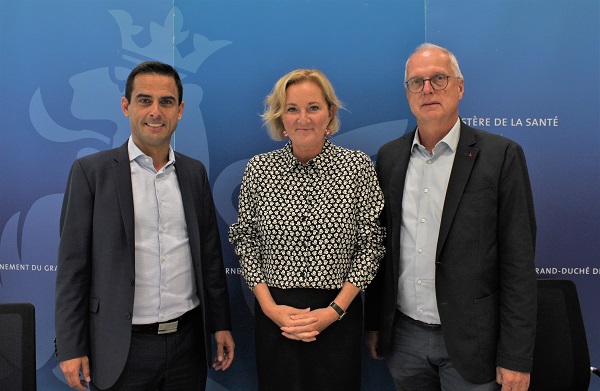 (L-R) Max Hahn, Luxembourg's Minister for Family and Integration; Paulette Lenert, Minister of Health; Dr Jean-Claude Schmit, Director of Health;
Credit: MSAN
(L-R) Max Hahn, Luxembourg's Minister for Family and Integration; Paulette Lenert, Minister of Health; Dr Jean-Claude Schmit, Director of Health;
Credit: MSAN
On Friday 1 September 2023, Paulette Lenert, Luxembourg’s Deputy Prime Minister and Minister of Health, Max Hahn, Luxembourg's Minister for Family Affairs and Integration, and Dr Jean-Claude Schmit, Director of Health, presented the palliative and end-of-life care plan for the years 2023 to 2026.
This plan aims to improve the quality of care and support for people at the end of life in Luxembourg. It is the result of close collaboration between Luxembourg’s Ministry of Health and Luxembourg's Ministry of Family Affairs, Integration and the Greater Region, and it was developed with the participation of a drafting committee made up of experts and representatives from key palliative and end-of-life care organisations.
According to the ministries, the national palliative and end-of-life care plan’s main objective is to inform and educate the population about patients’ rights and of the options available to them in terms of palliative care, end-of-life concerns, euthanasia and assisted suicide. It also emphasises the improvement of coordination between the various health actors, such as doctors, nurses and caregivers, in order to ensure optimal and consistent care.
According to the Ministry of Health and the Ministry of Family, the following measures can be cited among the plan’s main provided measures:
- information campaigns will be launched to raise awareness and break taboos surrounding end-of-life and death, and to inform the public about patients' rights and the resources available in palliative care;
- training programmes will be set up to help improve healthcare professionals’ skills in palliative and end-of-life care, aiming to provide quality care adapted to the needs of end-of-life patients;
- steps will be taken to facilitate access to essential medicine used in palliative and end-of-life care to ensure effective pain and symptom relief (the automatic marketing authorisation in Luxembourg has been initiated for a drug based on midazolam used for sedation in palliative care outside of hospital);
- the plan aims to improve the consistency and enforcement of the legal framework relating to palliative care, euthanasia and assisted suicide, while respecting the choices and wishes of patients;
- particular attention will be paid to children requiring palliative care, with the development of a new concept of care adapted to this young population, and the creation of a respite home to offer support to families.
Minister Lenert said: “We must break the taboos surrounding these delicate subjects. This national end-of-life and palliative care plan marks a significant step forward in our approach to end-of-life. We want to ensure that each person, and their family, receives respectful support, quality care and the opportunity to make informed end-of-life choices.”
Minister Hahn said that “the Family Ministry is working in the same direction. We must broach the subject and talk about it as a couple, as a family, and not only when it is perhaps already too late, but early enough so that we know afterwards, with a clear conscience, that if something were to happen, end of life would be settled. This is a great relief not only for the individual concerned, but also for all the survivors who do not have to make such important and difficult decisions themselves, in the uncertainty of whether their decision is in line with the individual concerned".
According to the Ministry of Family, Integration and the Greater Region great importance should be attached to the development of training. From the basic training, but also in the continuing education of health professionals, transmitting solid knowledge will allow the medical staff to be at ease with people who are in an end-of-life situation. With "Omega 90", the Ministry of Family, Integration and the Greater Region has an essential partner for the training of professionals, volunteers and those who are very close to an individual concerned. “Mäi Wëlle, mäi Wee” (my will, my way) also carries out awareness-raising work in this area.
In addition, the government has invited Luxembourg’s citizens to inform themselves and to actively participate in these initiatives, in order to contribute to the improvement of care and support at the end of life in Luxembourg.
More information about the national end-of-life and palliative care plan is available online on sante.lu.








